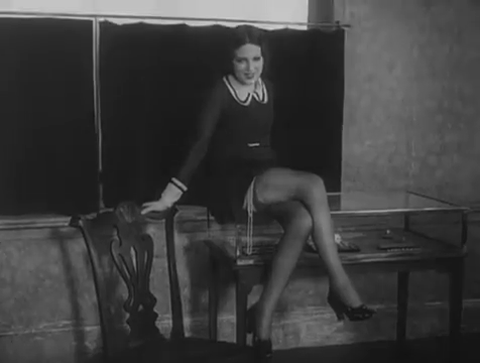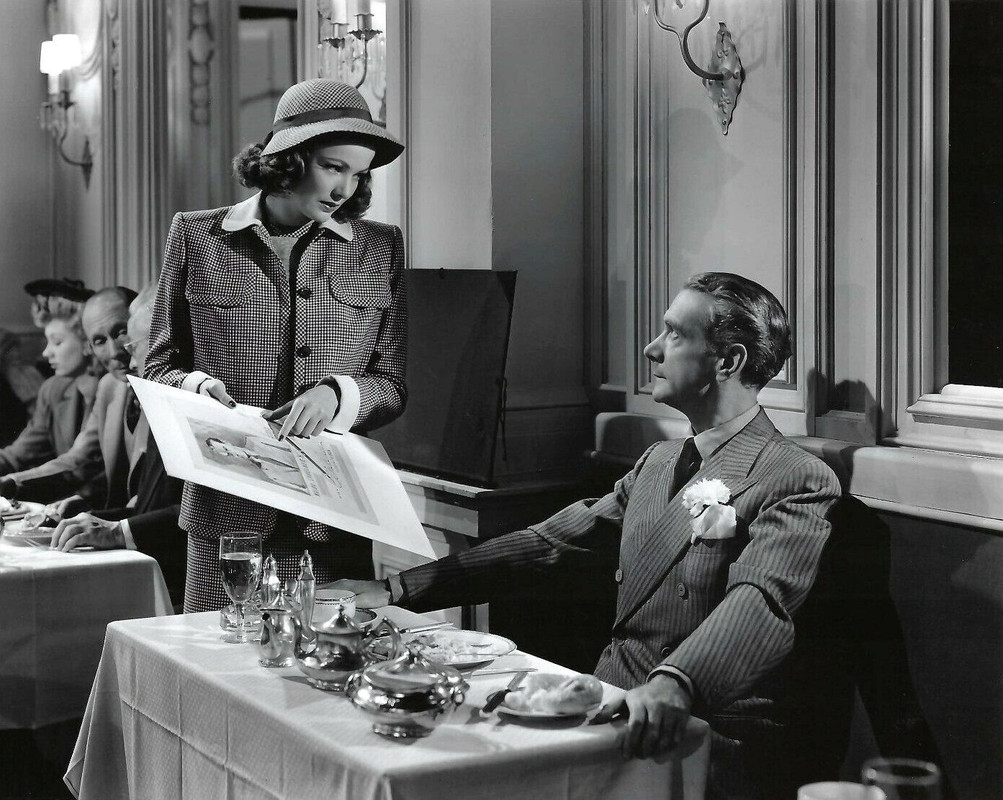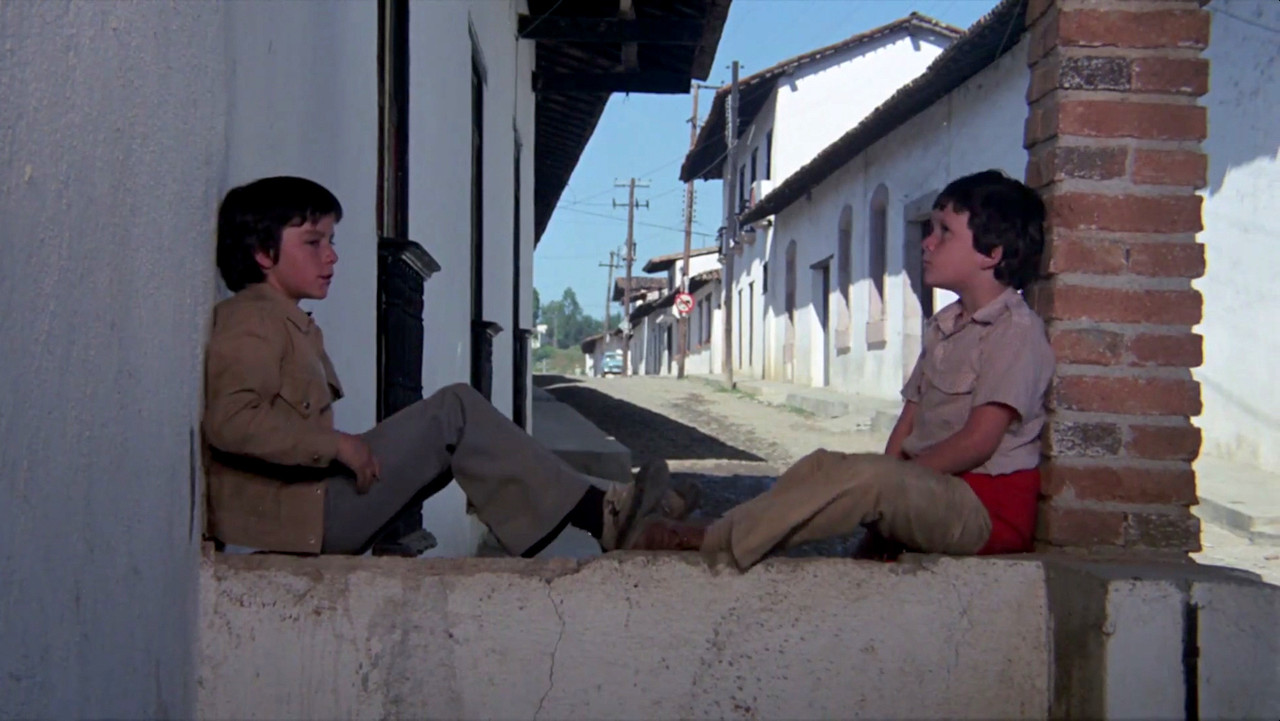La perle [The Pearl] (Henri d'Ursel, 1929)
Dec
15
National Wear Your Pearls Day

A giddy Kissa Kouprine as the jewellery salesgirl. A pearl necklace jauntily dangles from her suspender. DP: Marc Bujard.
Pearls worn for National Wear Your Pearls Day (USA). No one said those pearls were to be worn in the obvious place.
crime
“Have you seen Mr Tavernier tonight?”Ascenseur pour l'échafaud [Elevator to the Gallows] (Louis Malle, 1958)
Dec
13
croissants

Mr Tavernier (Maurice Ronet) taking a bite out of a croissant while dialling a number in a lively French café. A blonde behind him shows an interest. DP: Henri Decaë.
“I don't use a pen. I write with a goose quill dipped in venom.”Laura (Otto Preminger + Rouben Mamoulian, 1944)
Dec
11

Laura Hunt (Gene Tierney) interrupts arsine newspaper columnist Waldo Lydecker (a delicious Clifton Webb) with her designs during his lunch. DPs: Joseph LaShelle & Lucien Ballard.
– Waldo Lydecker
“Men! The beasts! God would show wisdom if he took the hands from all of them!” The Unknown (Tod Browning, 1927)
Dec
3
Let's Hug Day

Target girl Nanon (Joan Crawford) hugs her circus partner, Alonzo (Lon Chaney) the knife thrower. Her tight embrace may reveal his secret. DP: Merritt B. Gerstad.
Someone's hugged on Lets Hug Day (USA)
Nanon Zanzi (Joan Crawford) is mortally afraid of men. Of their grabbing, grasping, groping hands. This is why she only trusts her knife throwing partner Alonzo the Armless (Lon Chaney). What she doesn't know is that Alonzo and his 4'10”/1,47 m accomplice Cojo (that great staple of precode horror Tufei Filhela aka John George), use the #circus to hide from the long arm of the law, who is looking for a murderer with a deformed thumb. Who would suspect an armless man?
– Nanon Zanzi
As mighty as Alonzo may be, the incomparable Lon Chaney owes much to armless violinist and knife thrower “Judge” Paul Desmuke. Story goes that Desmuke taught Chaney his knife act in two months. More probable is that some of the more impressive close-up scenes show the Judge's, not Chaney's, feet.
Like Alonzo, The Unknown has lost some flesh. Until 1968, only mangled bootlegs were available; a complete print was considered non-existent. Five years later, news broke about film reels of unknown origin labelled inconnu – [the] unknown, somewhere in the bowels of the Cinémathèque Française.
Some 14 minutes, outlining the Armless' background, are still missing. Do check your attic.
Si muero antes de despertar [If I Should Die Before I Wake] (Carlos Hugo Christensen, 1952)
Nov
28
soup

Lucio (Néstor Zavarce) having dinner with his mother (Blanca del Prado) and strict father. DP: Pablo Tabernero.
“Selling the Brooklyn Bridge again, huh?”Every Day's a Holiday (A. Edward Sutherland, 1937)
Nov
21
National Entrepreneurs Day

Lobbycard. Peaches O'Day (Mae West, dressed by Schiaparelli) hands her business card to yet another sucker. They're on the Brooklyn Bridge, which can be seen in the background. DP: Karl Struss.
The main character is an entrepreneur: National Entrepreneur's Day (USA)
In my book, entrepreneur is just a fancy talk for conman. A famous one, the one who may've tried to sell you the Brooklyn Bridge, was George C. Parker. He'd peddle the famous landmark to any hapless rube, immigrant, or sucker who then would promptly erect a little tollbooth to make a fast buck from any hapless rube, immigrant, or sucker.
– Police captain Jim McCarey
Like Parker, Mae West's Peaches O'Day bamboozles it her way. And boy, does she have a bridge to sell you!
– Get the Ouija board. – It's got the Bible on top of it, keeping it quiet. The Bat Whispers [The Bat] (Roland West, 1930)
Nov
19
Play Monopoly Day

Board and planchette at the ready for a little game of Ouija. DPs: Ray June (23mm) & Robert H. Planck (70mm).
Play a board game on Play Monopoly Day (USA)
It's just a little game. But then you wonder if Ouija, the Wonderful Talking Board is actually just that. Two neat little ladies playing that quirky 1891 novelty game in Roland West's The Bat Whispers summon the aforementioned bat, black-clad fiend and Batman predecessor.
Who is he? What does he want? And how can he be stopped? Do you know the answer?
YES
NO
GOOD BYE
کلوزآپ ، نمای نزدیک [Klūzāp, nemā-ye nazdīk / Close-Up] (Abbas Kiarostami, 1990)
Nov
8

Hossain Sabzian as himself. He sits behind a low table holding various refreshments, presented by his host. DP: Ali Reza Zarrindast.
Matinée (Jaime Humberto Hermosillo, 1977)
Nov
4
National Easy Bake Oven Day

Friends Aarón (Rodolfo Chávez Martínez) and Jorge (Armando Martín) having a grownup discussion about the situation. DP: Jorge Stahl Jr..
Two boys skip class to catch a movie – Alexander Mackendrick's thematically similar A High Wind in Jamaica (1965) – and end up as members of a violent gang instead. While Matinée has elements of a typical 70s #ComingOfAge movie, the more fascinating element is the role reversal of the two children and the robbers. As the kids are forced to grow up, fast, the criminals live out their childhood fantasy of never having to listen to anyone ever again. And bicker over comics.
Robert Rodriguez stated that the fearsome criminals in his El Mariachi (1992) never outgrew their childhood nicknames. I start to suspect that once upon a time, a little boy named Robertiño skipped class and went to the matinee.
みな殺しの霊歌 [Minagoroshi no reika / I, the Executioner] (Tai Katō, 1968)
Oct
26

A claustrophobically framed black-and-white shot of a man (Makoto Satō) handling chopsticks close to his face. DP: Keiji Maruyama.